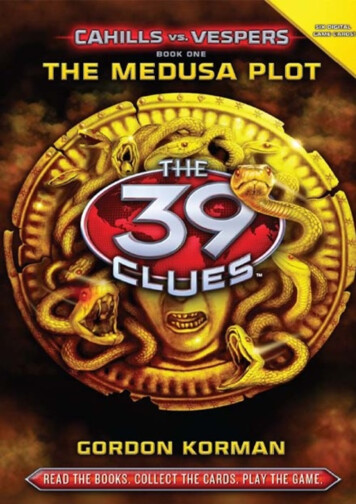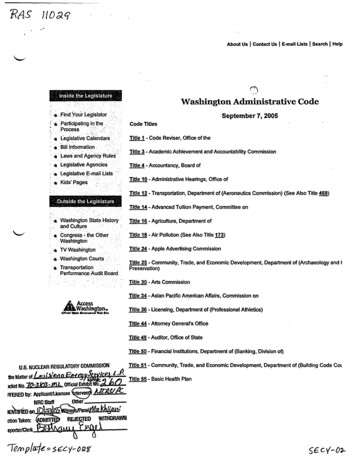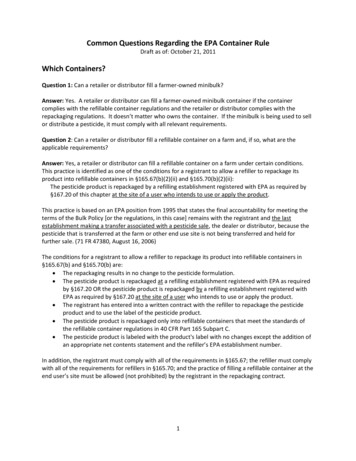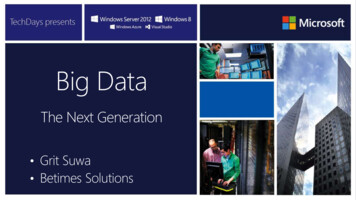
Transcription
TITLE 165. CORPORATION COMMISSIONCHAPTER 30. MOTOR CARRIERS, PRIVATE CARRIERS AND TRANSPORTATIONNETWORK COMPANIESEFFECTIVE AUGUST 1, 2019Last AmendedThe Oklahoma RegisterVolume 36, Number 21July 15, 2019 PublicationPages 483-1092PLEASE NOTE: This is not the official version of the Oklahoma Administrative Code.Official rules are available from the Office of Administrative Rules of the OklahomaSecretary of State. This copy is provided as a convenience to our customers. In the event thisunofficial version of the rules differs from the official version of the OklahomaAdministrative Code in any way, the official version shall control.This publication is issued by The Oklahoma Corporation Commission, as authorized by 75 O.S. § 254(B), and is located at no co st to the end userat the following website: http://www.occeweb.com/rules/rulestxt.htm. Further, printed copies are available at a cost of 10.00 each, pursuant toOAC 165:5-3-1(d)(6). This publication has been submitted in compliance with Section 3-114 of Title 65 of the Oklahoma Statutes.
TABLE OF CONTENTSSUBCHAPTER 1. GENERAL PROVISIONS165:30-1-1. Purpose165:30-1-2. DefinitionsSUBCHAPTER 3. INTRASTATE MOTOR CARRIERSPart 1. Applying for a License165:30-3-1. Obtaining a license165:30-3-3. License and certificate renewalsPart 3. License Requirements165:30-3-11. Insurance165:30-3-12. Identification device165:30-3-13. Deleterious Substance Transport Permit165:30-3-16. Current address requirement165:30-3-17. MarkingsPart 5. Conducting Operations165:30-3-31. Compliance with laws and regulations165:30-3-32. Shipping documentation165:30-3-33. Records165:30-3-34. Minimum standards165:30-3-37. Leasing of equipmentPart 7. Change of Name of License Holder165:30-3-51. Name changesPart 9. Violations165:30-3-71. Loading capacity – Safety compliance165:30-3-73. Leasing of license165:30-3-75. Advertising165:30-3-76. Contempt complaintPart 11. Miscellaneous165:30-3-92. Pollution abatementPart 13. Suspension or Cancellation of License165:30-3-101. Voluntary suspension or discontinuance of license165:30-3-102. Involuntary suspension or revocation of license165:30-3-103. Reinstatement of certificate or permit or license165:30-3-104. ViolationsSUBCHAPTER 6. TRANSPORTATION NETWORK COMPANIESPart 1. Applying for a Permit165:30-6-1. Obtaining a permit165:30-6-3. TNC Permit renewals165:30-6-5. Insurance165:30-6-7. Name changesPart 3. Conducting Operations165:30-6-17. Current address requirement165:30-6-19. Compliance with laws and regulationsi
165:30-6-21. RecordsPart 5. Violations165:30-6-33. Leasing of TNC Permit165:30-6-35. Operating or Advertising to Operate without a Permit165:30-6-37. ViolationsPart 7. Suspension or Cancellation of Permit165:30-6-47. Voluntary cancellation of permit165:30-6-49. Involuntary suspension or revocation of permit165:30-6-51. Reinstatement of TNC PermitSUBCHAPTER 7. PROCEDURAL RULES165:30-7-5. Forms165:30-7-6. Applications and requests165:30-7-7. Records and inspections165:30-7-11. USDOT number165:30-7-12. Revocation, suspension or denial of issuance of license, permit, certificate orregistration165:30-7-13. Disqualification procedure165:30-7-15. Operations conducted under government contract165:30-7-17. Insurance filing replacement165:30-7-27. Definitions165:30-7-29. Registration and signatures165:30-7-31. Electronic system usage165:30-7-33. Technical failureSUBCHAPTER 10. INTERSTATE MOTOR CARRIERSPart 1. Compliance165:30-10-1. USDOT number required165:30-10-3. Liability insurance165:30-10-5. Deleterious Substance Transport Permit165:30-10-7. Hazardous waste transportation165:30-10-9. Minimum standardsPart 3. Conducting Operations165:30-10-11. Lease agreement165:30-10-13. Shipping documentation165:30-10-15. Compliance with laws and regulations165:30-10-17. Loading capacity165:30-10-19. Pollution abatementPart 5. Violations165:30-10-31. Contempt complaint165:30-10-32. ViolationsPart 7. Interstate Motor Carriers Operating in Intrastate Commerce165:30-10-41. Intrastate authority required165:30-10-43. Exceptions to intrastate renewal requirements165:30-10-45. Miscellaneousii
SUBCHAPTER 12. UNIFIED CARRIER REGISTRATION165:30-12-1. Unified Carrier RegistrationSUBCHAPTER 13. INTRASTATE HOUSEHOLD GOODS CERTIFICATESPart 1. Obtaining Authority165:30-13-2. Obtaining a household goods certificate165:30-13-4. Reissuance of certificatePart 3. Household Goods Certificate Requirements165:30-13-11. Insurance165:30-13-12. Identification device165:30-13-15. Markings165:30-13-16. Current address requirementPart 5. Conducting Operations165:30-13-20. Estimates165:30-13-22. Consumer protection information165:30-13-24. Valuation and liability165:30-13-26. Bill of Lading165:30-13-27. Blank or incomplete documents165:30-13-28. Additional services165:30-13-31. Compliance with laws and regulations165:30-13-33. Records165:30-13-34. Minimum standards165:30-13-36. Loss, damage and concealed claims165:30-13-37. Leasing of equipmentPart 7. Name Changes165:30-13-51. Name changesPart 9. Violations165:30-13-71. Loading capacity-Safety compliance165:30-13-72. Leasing of authority165:30-13-73. Advertising165:30-13-74. Contempt complaintPart 11. Suspension or Cancellation of Authority165:30-13-92. Involuntary suspension or revocation of a household goods certificate165:30-13-93. Reinstatement of certificate165:30-13-94. ViolationsSUBCHAPTER 15. INTRASTATE PRIVATE CARRIERSPart 1. General Provisions165:30-15-1. PurposePart 3. Obtaining a Private Carrier License and License Requirements165:30-15-4. Obtaining a license165:30-15-5. License renewals165:30-15-6. Insurance165:30-15-7. Current address requirement165:30-15-8. Name changes165:30-15-9. Identification deviceiii
Part 5. Conducting Operations165:30-15-11. Deleterious Substance Transport Permit165:30-15-12. Markings165:30-15-13. Compliance with laws and regulations165:30-15-14. Shipping documentation165:30-15-15. Minimum standards165:30-15-16. Leasing of equipment165:30-15-17. Leasing of licensePart 7. Violations, Suspension or Cancellation165:30-15-31. Loading capacity-safety compliance165:30-15-32. Contempt complaint165:30-15-33. Pollution abatement165:30-15-34. Violations165:30-15-35. Suspension or discontinuance of license165:30-15-36. Reinstatement of a private carrier licenseSUBCHAPTER 16. INTERSTATE PRIVATE CARRIERS165:30-16-1. USDOT numbers and markings165:30-16-2. Lease agreement165:30-16-3. Shipping documentation165:30-16-4. Compliance with laws and regulations165:30-16-5. Minimum standards165:30-16-6. Loading capacity165:30-16-7. Contempt complaint165:30-16-8. Pollution abatement165:30-16-9. Deleterious Substance Transport Permit165:30-16-11. ViolationsSUBCHAPTER 17. HAZARDOUS WASTE TRANSPORTERSPart 1. General Provisions165:30-17-1. Purpose and applicability165:30-17-2. Cooperation with other base statesPart 3. Applying for Hazardous Waste Registration and Permit165:30-17-11. Selection of base state165:30-17-12. Obtaining a hazardous waste registration and permit165:30-17-13. Filing of proof of proper liability insurance165:30-17-14. Letter of filing165:30-17-15. Filing fee calculation165:30-17-16. Ownership of registration and permitPart 5. Conducting Operations165:30-17-31. Shipping documentation165:30-17-32. Markings165:30-17-33. Leasing of equipment165:30-17-34. Name Changes165:30-17-35. Address changesiv
Part 7. Violation, Suspension or Revocation of a Permit165:30-17-51. Inspections, reviews and audits165:30-17-52. Advertising165:30-17-53. Suspension, revocation and denial165:30-17-54. Reinstatement of a hazardous waste permit165:30-17-55. Violations165:30-17-56. Contempt complaintSUBCHAPTER 19. REGISTRATION PURSUANT TO THE INTERNATIONALREGISTRATION PLAN165:30-19-1. Purpose165:30-19-2. Definitions165:30-19-3. Registration165:30-19-4. Title requirements and proof of ownership165:30-19-5. Established place of business165:30-19-6. Registration as a resident165:30-19-7. Operational records165:30-19-8. Maintenance and availability of operational records165:30-19-9. Failure to pay additional fee assessments165:30-19-10. Renewal applications165:30-19-11. Enforcement165:30-19-12. Supplemental application165:30-19-14. Audits165:30-19-15. Mileage165:30-19-16. Application disapproval165:30-19-17. Temporary registration165:30-19-18. Compliance confirmation165:30-19-19. Trip permits and hunters permits165:30-19-20. Incorporation by referenceSUBCHAPTER 21. INTERNATIONAL FUEL TAX AGREEMENT165:30-21-1. Purpose165:30-21-2. Definitions165:30-21-3. Application and renewal165:30-21-4. Fuel permits165:30-21-5. Application for license165:30-21-6. Designation of licensee165:30-21-7. Application processing165:30-21-8. Non-issuance of license165:30-21-9. Bond requirement165:30-21-10. Bond amount165:30-21-11. License renewal165:30-21-12. Denial, revocation, and reinstatement165:30-21-13. Reporting requirements165:30-21-14. Due and delinquency dates165:30-21-15. Penaltyv
165:30-21-16. Interest165:30-21-17. Incorporating the International Fuel Tax Agreement165:30-21-18. Operational records165:30-21-19. Maintenance and availability of operational records165:30-21-20. AuditsSUBCHAPTER 23. MOTOR LICENSE AGENTS ("MLA")165:30-23-1. Responsibility for errors in application and computation165:30-23-2. Allowable fees and charges165:30-23-3. Responsibility for agency shortages165:30-23-5. Motor license agent conductSUBCHAPTER 25. HARVEST PERMITS165:30-25-1. Harvest permitsSUBCHAPTER 26. NONCONSENSUAL WRECKER AND TOWING SERVICESPart 1. Nonconsensual Wrecker and Towing Services Rate Change Applications165:30-26-1. Purpose165:30-26-2. Definitions165:30-26-3. Application; application package; and staff response to filed application package165:30-26-4. Limitations on filing rate causePart 3. Response to Nonconsensual Towing Rate Complaints165:30-26-10. Receipt of nonconsensual towing rate complaints165:30-26-11. Review of nonconsensual towing rate complaints165:30-26-12. Nonconsensual towing rate complaint resolution and contesting a ViolationNotification165:30-26-13. Closure165:30-26-14. Nonconsensual towing rate complaints and audits165:30-26-18. Display of nonconsensual towing rates[Authority: OKLA. CONST. Art IX, §§ 18, 19; 17 O.S., § 40; 47 O.S., §§ 161 through 230.34b,966, 1013, 1106 and 1166 through 1170][Source: Codified 12-31-91]vi
SUBCHAPTER 1. GENERAL PROVISIONS165:30-1-1. PurposeThe public policy of this State, as declared by the Legislature, requires that motor carriers andprivate carriers, except as provided in this Chapter, should be regulated by theOklahoma Corporation Commission, hereinafter referred to as the Commission, to protect thepublic interest, the environment and the highways of the state of Oklahoma and ensure compliancewith applicable safety rules and regulations. The public policy of this State, as further declared bythe Legislature, requires that motor carriers of household goods be regulated by the Commissionin such manner as to establish standards for public safety, fair competitive practices, adequate anddependable service and protection of shippers from deceptive or unfair practices. The publicpolicy of this State, as further declared by the Legislature, requires that transportation networkcompanies be regulated by the Commission in such a manner as to implement and enforce publicsafety standards and insurance requirements as required by statute. The rules in this Chapter areintended to implement that public policy and to carry out the Commission's statutory duty ofregulation in the public interest. In case of doubt as to the meaning of any language of the rules inthis Chapter, that construction should be adopted which is consistent with the Constitution andStatutes of Oklahoma.[Source: Amended at 12 Ok Reg 1005, eff 1-1-95 (emergency); Amended at 12 Ok Reg 2077, eff7-1-95; Added at 26 Ok Reg 2947, eff 6-22-09 (emergency); Amended at 27 Ok Reg 1773, eff 71-10; Amended at 33 Ok Reg 633, eff 9-1-16]165:30-1-2. DefinitionsIn addition to terms defined in 47 O.S., Sections 161 through 180m et seq., the OklahomaTransportation Network Company Services Act and the Motor Carrier Act of 1995, the followingwords or terms, when used in this Chapter, shall have the following meaning unless the contextclearly indicates otherwise:"110% rule" means the household goods carrier must deliver the shipper's goods once theshipper pays 110% of the estimated or agreed upon charges."Alliance" means the Alliance for Uniform Hazardous Material Transportation Procedures, aconfederation of state, local industry and environmental representatives for the purpose ofadministering and enforcing a uniform hazardous materials transporters program as established byHMTUSA."Accessorial services" means services provided by an intrastate motor carrier of householdgoods at the request of a shipper that may be in addition to the actual transportation of thehousehold goods. Examples of accessorial services are packing, unpacking, appliance servicing,loading/unloading of large items (such as a piano), climbing/descending stairs, demurrage, etc."Audit" means an examination of records, source documents and any other informationsupporting a regulated entity's application or return; or a review performed by staff as a result of acomplaint or prior enforcement actions taken."Authority" means a general term referring to permission issued by the Commission to amotor carrier to perform operations under the jurisdiction of the Commission. The term authorityis not applicable to vehicle registrations, fuel licenses or permits, or TNC permits."Base state" means the state selected by a motor carrier according to the proceduresestablished by a uniform program.OAC 165:30 Motor Carriers, Private CarriersAnd Transportation Network Companies1Effective August 1, 19
"Binding estimate" means a written agreement made in advance between the intrastatehousehold goods carrier and the shipper which guarantees the total cost of the transportation of thehousehold goods based upon the quantities and services shown on the estimate."CFR" means the Code of Federal Regulations."Consignee" means the person or place shown on the shipping documentation as the locationto which a carrier is directed to deliver a shipment."Consignor" means the person who offers goods for shipment."Commission" means the Oklahoma Corporation Commission."Corporate family" means a group of corporations consisting of a parent corporation and allsubsidiaries in which the parent corporation owns directly or indirectly one hundred percent(100%) interest."Deleterious substance" means any chemical, salt water, oilfield brine, waste oil, wasteemulsified oil, basic sediment, mud or injurious substances produced or used in the drilling,development, production, transportation, refining and processing of oil, gas and/or brine mining."Environmental restoration" means restitution for loss, damage, or destruction of naturalresources arising out of the accidental discharge, dispersal, release or escape into or upon the land,atmosphere, watercourse, or body of water, of any commodity transported by a motor carrier. Thisincludes the cost of removal and the cost of necessary measures taken to minimize or mitigatedamage to human health, the natural environment, fish, shellfish and wildlife."Exceeding authority" means a motor carrier operating outside or beyond the purview of anissued license, certificate, permit, registration or other authority issued by the Commission or areciprocal state."FMCSA" means the Federal Motor Carrier Safety Administration."For-hire motor carrier" means a person operating upon any public highway engaged in thetransportation of property or passengers for compensation or consideration or for commercialpurposes."Gross Combination Weight Rating" (GCWR) means the value specified by themanufacturer as the loaded weight of a combination (articulated) vehicle. In the absence of a valuespecified by the manufacturer, GCWR will be determined by adding the GVWR of the power unitand the total weight of the towed unit and any load thereon."Gross Vehicle Weight" (GVW) means the registered weight of the vehicle or any lawfulregistered combination weight (Gross Combination Weight or GCW)."Gross Vehicle Weight Rating" (GVWR) means the value specified by the manufacturer asthe loaded weight of a single vehicle (gross vehicle weight rating) and may include any lawfulcombination."Harvest permit" means a document issued by the Commission to a motor carrier engagingin the commercial transportation of farm products in a raw state. A harvest permit encompassesvehicle registration, fuel permit and intrastate operating authority requirements of the State ofOklahoma."Hazardous waste" means any material that is subject to the "Hazardous Waste ManifestRequirements" of the United States Environmental Protection Agency specified in Title 40, CFR,Part 262."Hazardous waste permit" means the document issued by a participating state whichrepresents a specific motor carrier's registration to transport hazardous waste in states thatparticipate in the uniform hazardous waste program."HMTUSA" means the Hazardous Materials Transportation Uniform Safety Act of 1990.OAC 165:30 Motor Carriers, Private CarriersAnd Transportation Network Companies2Effective August 1, 19
"Household goods" means the used personal effects and property of a dwelling."Hunter's permit or Unladen permit" means a permit that provides temporary registrationto an apportionable vehicle at the unladen (empty) weight of the vehicle. It is commonly used bya vehicle lessor to move a vehicle, without any load, to another jurisdiction so the lessor canestablish a new contractual relationship with a different motor carrier."Identification device" means an annual, fee-paid, nontransferable device issued by theCommission to be carried in each and every vehicle."IFTA" means the International Fuel Tax Agreement. The IFTA is a motor fuel use taxreciprocity agreement between the United States contiguous states and certain Canadian provinceswhich allows a licensee to report and pay motor fuel use taxes to a base jurisdiction for distributionto other member jurisdictions in which the licensee traveled and incurred motor fuel use taxliability."Intercorporate hauling" means the transportation of property, passengers or householdgoods by motor vehicle, for compensation, by a carrier which is a member of a corporate family,as defined in this Section, when said transportation for compensation is provided for othermembers of the corporate family."Interstate" means a shipment having an origin or destination into, out of or through two ormore states."Intrastate" means a shipment having an origin and destination wholly within one state."IRP" means the International Registration Plan. The IRP is a commercial vehicle registrationreciprocity agreement between the United States contiguous states and certain Canadianprovidences which allows a registrant to pay and report commercial vehicle registration fees to abase jurisdiction for distribution to other member jurisdictions in which the registrant travels."IVDR" means an Individual Vehicle Distance Record which is a document where therequired operational information, as set forth by IRP and IFTA, can be recorded."Letter of filing" means a document issued by the Commission to a motor carrier as evidenceof temporary compliance with the hazardous waste uniform program."Motor carrier" means a for-hire motor carrier or a private motor carrier operating ininterstate or intrastate commerce."Motor License Agent (MLA)" means any person meeting the requirements for appointmentas a motor license agent pursuant to 47 O.S. § 1140 and authorized by the Oklahoma CorporationCommission to process vehicle registrations, collect associated fees and issue credentials pursuantto the IRP and the Oklahoma Vehicle License and Registration Act (47 O.S. Chapter 74)."NAIC" means the National Association of Insurance Commissions."Non-binding estimate" means the estimated total cost to transport household goodsintrastate based upon the weight of the shipment, volume of the shipment, amount of time toperform the movement and/or any accessorial services requested."OTNCS Act" means the Oklahoma Transportation Network Company Services Act, 47 O.S.§ 1010 et seq."Participating state" means a state electing to participate in a uniform program by enteringinto a base state agreement."PIN" means personal identification number."Principal place of business" means a single location that serves as the motor carrier'sheadquarters and where it maintains or can make available its operational records."Private motor carrier" means a person who operates a commercial motor vehicle and is nota for-hire motor carrier.OAC 165:30 Motor Carriers, Private CarriersAnd Transportation Network Companies3Effective August 1, 19
"Process agent" means a representative upon whom court papers may be served in anyproceeding brought against a motor carrier, broker, or freight forwarder."Registration" means the identification of hazardous waste transporters through a nationalbase state system."Reciprocal state" means a jurisdiction with which the Commission has entered into areciprocal agreement regarding the uniform registration, licensing or permitting of motor carriers."Shipper" means a person authorized to tender a shipment to a carrier and may include, butis not limited to, a consignor, consignee or beneficial owner of the shipment."TNC" means a Transportation Network Company."Trip permit" means a temporary authorization issued by the Commission grantingpermission to conduct operations as a motor carrier in intrastate and/or interstate commerce."Truck yard pit" means any pit used to store or catch fluids or wash fluids in a truck terminalor maintenance facility as the result of transportation related activities."UCR" means Unified Carrier Registration."Uniform application" means a uniform motor carrier registration, licensing or permitapplication form established under a uniform program."Uniform program" means any law, rule, policy, practice and/or all combinations thereofwhich pertain to the regulation of motor carriers by motor vehicle operating in interstate orintrastate commerce over the highways of Oklahoma and is recognized, adopted and enforced oradministered by the Transportation Division only when in concert and reciprocal with one or morestates which adopt, recognize, administer and enforce the exact same rule, law, policy, practiceand/or all combinations thereof."Unprocessed agricultural commodities" means all products raised or produced by tillageand cultivation of the soil, pasture grasses, orchard products, trees in their raw state and productsproduced by livestock (such as milk, wool, eggs, honey and manure). The term also includes thoseproducts embraced within the above definition which have been processed for purposes ofhandling, storage, preservation or transportation (such as washing, cleaning, wrapping, packaging,boxing, baling, trimming, drying, sorting, sizing, grading, cooling, spraying and fumigating). Theterm does not include those products embraced within the above definition which, as a result ofsome treatment or processing, have been so changed that they are no longer in their natural or rawstate, but possess new forms, qualities, or properties or result in combinations."USDOT" means the United States Department of Transportation.[Source: Amended at 10 Ok Reg 4447, eff 1-1-94 (emergency); Amended at 10 Ok Reg 4497, eff1-1-94 (emergency); Amended at 11 Ok Reg 3727, eff 7-11-94; Amended at 11 Ok Reg 3735, eff7-11-94; Amended at 12 Ok Reg 1005, eff 1-1-95 (emergency); Amended at 12 Ok Reg 2077, eff7-1-95; Amended at 13 Ok Reg 247, eff 11-1-95 (emergency); Amended at 13 Ok Reg 2419, eff7-1-96; Amended at 14 Ok Reg 1251, eff 5-12-97; Amended at 14 Ok Reg 2539, eff 7-1-97;Amended at 15 Ok Reg 3041, eff 7-15-98; Amended at 18 Ok Reg 23, eff 10-11-00 (emergency);Amended at 18 Ok Reg 2384, eff 7-1-01; Amended at 23 Ok Reg 2325, eff 7-1-06; Amended at24 Ok Reg 1814, eff 7-1-07; Amended at 25 Ok Reg 1546, eff 7-1-08, Amended at 27 Ok Reg1773, eff 7-1-10; Amended at 33 Ok Reg 633, eff 9-1-16; Amended at 34 Ok Reg 977, eff 9-1117]OAC 165:30 Motor Carriers, Private CarriersAnd Transportation Network Companies4Effective August 1, 19
SUBCHAPTER 3. INTRASTATE MOTOR CARRIERSPART 1. APPLYING FOR A LICENSE165:30-3-1. Obtaining a license(a) No intrastate motor carrier shall operate upon any street, road, public highway or dedicatedpublic thoroughfare of this State for the transportation of passengers or property for hire withoutfirst obtaining from the Commission a license as provided in this Section. A license issued underthis Subchapter shall not include transportation as a motor carrier of household goods. Motorcarriers of household goods must comply with Subchapter 13 of this Chapter.(1) An applicant for a license shall file with the Commission a written application on theappropriate form prescribed by the Commission (TDF 1), and shall tender with the applicationa filing fee as prescribed by law or by Commission rule.(2) The application shall be assigned a personal identification number (PIN), which shall bethe permanent identification number for all matters relating to authority granted therein. Anyapplication thereafter filed to amend the license by the same applicant shall be filed in the samecause under the original PIN, and otherwise shall be governed by the provisions of this Chapterrelating to an application for license. Each subsequent application shall also bear a sub-numberin sequence.(3) A license shall be personal to the holder thereof, and shall be issued only to an individual,a corporation, a limited liability corporation, a partnership or some other legally recognizedentity.(4) The filing of an application for a license does not of itself authorize any motor carrieroperations by the applicant. Such operations are prohibited until after all requirements havebeen met, and a license has been issued. All requirements for compliance with this Chaptershall be met within thirty (30) days from date of receipt of a motor carrier license applicationby the Commission. Failure to comply will result in dismissal of the application for a license.Licenses issued shall be valid for a maximum of one year and may be renewed after applicationhas been filed as provided by this Chapter.(5) No license for intrastate operations shall be issued until after the applicant has provided asatisfactory USDOT safety rating or the applicant has demonstrated its ability to conductoperations in a safe and reasonable manner and applicant is in compliance with all applicablerules and laws of the State of Oklahoma; has furnished proper proof of all insurance requiredby this Chapter and all applicable state statutes; and has purchased an appropriate number ofidentification devices.(6) The application shall require the following:(A) Name, single trade name (if any), mailing address, physical address, email address,telephone number and domicile county of the applicant.(B) The type of applicant (indicating if sole proprietorship, partnership, corporation orother legal entity), specifying the names of all partners, officers and/or directors listing themailing, physical and email addresses of each.(C) The type of operations for which the applicant is applying.(D) The name and address of the motor carrier's process agent in Oklahoma (if the motorcarrier does not maintain its principal place of business or a terminal in Oklahoma).(E) Declaration of its USDOT number. Motor carriers without a USDOT number mustobtain a USDOT number from FMCSA or the Commission prior to a license being issued.OAC 165:30 Motor Carriers, Private CarriersAnd Transportation Network Companies5Effective August 1, 19
(F) Declaration of its USDOT safety rating and safety compliance.(G) Declaration of size and weight compliance.(H) A listing of all power vehicles and trailers to be used, detailing the model, make andcapacity of each vehicle and denoting whether each vehicle is owned or leased.(I) A description of all terminal and dock facilities.(J) Declaration the applicant is in full compliance with all other state laws, rules andregulations.(K) Any other information the Commission deems pertinent.(7) Every person operating under the Motor Carrier Act of 1995 and the rules of thisCommission shall possess a copy of this Chapter governing the operations of motor carriers.(8) A motor carrier desiring to modify its license operations shall file a sub application (TDF1). Sub applications to include hazardous materials must comply with the provisions in thisSection. Sub applications to modify other types of operations shall be exempt from (5) and(6)(D) -(I) of this subsection.(9) A copy of the current license under which a motor carrier operates shall be carried at alltimes in each power unit by the motor carrier.(b) A motor carrier engaged in intercorporate hauling shall be subject to this Subchapter.(c) Motor carrier operations, other than motor carriers of passengers, are exempt from thisSubchapter when:(1) Conducted strictly within a municipality, or(2) Conducted by a federal, state or local government.(d) Motor carriers of passengers shall be exempt from this Subchapter when:(1) Operating a taxicab, as defined by 47 O.S. § 1-174, wholly within a municipality, providedthe operator of the taxicab is licensed by the municipality in which business is conducted;(2) Operating a bus, as defined by 47 O.S. § 1-105, not between two or more cities or towns,provided the operator of the bus is licensed by a municipality in which business is conducted.(e) Applicant may be issued a provisional intrastate license not to exceed ninety (90) days fromthe date application is filed, provided all other requirements for the intrastate license have beenmet. Applicant must provide a written request for the provisional intrastate license to the Directorof the
Liability insurance 165:30-10-5. Deleterious Substance Transport Permit 165:30-10-7. Hazardous waste transportation 165:30-10-9. Minimum standards Part 3. Conducting Operations . Non-issuance of license 165:30-21-9. Bond requirement 165:30-21-10. Bond amount 165:30-21-11. License renewal 165:30-21-12. Denial, revocation, and reinstatement










